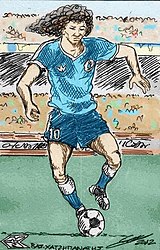Vassilis Hatzipanagis
| Vassilis Hatzipanagis | ||
 Sketch by Hatzipanagis
|
||
| Personnel | ||
|---|---|---|
| Surname | Vassilis Hatzipanagis | |
| birthday | October 26, 1954 | |
| place of birth | Tashkent , Uzbek SSR , USSR | |
| size | 173 cm | |
| position | midfield player | |
| Men's | ||
| Years | station | Games (goals) 1 |
| 1972-1975 | Pachtakor Tashkent | 96 (22) |
| 1975-1991 | Iraklis Thessaloniki | 281 (62) |
| National team | ||
| Years | selection | Games (goals) |
| 1975 | Soviet Union | 4 (1) |
| 1976 | Greece | 2 (0) |
| 1 Only league games are given. | ||
Vassilis Hatzipanagis (Greek: Βασίλης Χατζηπαναγής; born October 26, 1954 in Tashkent , Uzbek SSR ) is a former Soviet or Greek football player on the left winger position.
Life
The son of Greek war refugees in the USSR had been a player at the Pachtakor Tashkent football academy since he was 12 years old ; from there he advanced to the first team at the age of 16. In order to be allowed to play in the top Soviet league, he first had to apply for Soviet citizenship, which he did under pressure from the Pachtakor officials. At the age of 17 he made his professional debut and was soon called up for the U19 national team of the USSR; then he played eight times for the senior national team, including games in the qualifying tournament for the 1976 Olympic Games . He then moved back to his parents' homeland, although national coach Konstantin Beskow certified that he was "well above the Greek level". In the Soviet league, which he left, he was considered the best player after the great Oleg Blochin .
Hatzipanagis signed in 1975 with Iraklis Saloniki from Thessaloniki . He was so well known that the Veria Stadium (Iraklis moved there due to a stadium ban) sold out in its first game on December 7, 1975. As a result, he had offers from clubs such as Lazio Rome , Arsenal FC , FC Porto or VfB Stuttgart , but he never left Iraklis, which mainly caused his great solidarity with the fans. The club also feared the consequences of a sale. For these reasons, Hatzipanagis was still playing for the same club when he played his farewell game in the UEFA Cup against Valencia on September 19, 1990, shortly before his 36th birthday . In the league he had said goodbye since the previous year.
Another highlight in Hatzipanagis' career was his only international match on May 6, 1976; a friendly against Poland (1-0). Afterwards, however, he learned that he was not eligible to play for the Greek association because he had already played for the USSR. He played the second international match mentioned in his profile long after the end of his career, on December 14, 1999 when he was allowed to play for 22 minutes in his friendly against Ghana (1-1) in his honor.
In addition, Hatzipanagis received several awards, such as the appointment to a world selection (including Beckenbauer and Magath), which appeared on June 22, 1984 against New York Cosmos and the election of the Golden Player of Greece on the 50th anniversary of UEFA. He showed his pride that he had not yet been forgotten; At the same time, however, he expressed his regret that he had only played once for Greece and never in western leagues.
He owed his nickname, " Nureyev of football", because of its excellent technique, to the well-known journalist and Iraklis fan Giorgos Lianis. If he sees defenders, so Hatzipanagis, he wants to outplay them all. The press wrote about him that he could even dribble around his opponent in a phone booth.
According to an anecdote, several Greek defense lawyers once threatened to sue Hatzipanagis because "he made an idiot out of us in the field and we wanted retribution". Hatzipanagis also holds the national record of direct goals from the corner point - nine in total! Greeks who saw his games back then still see him today as level with superstars like Pelé or Maradona, which is also confirmed by the fact that at the age of 18 he was voted the second best player in the strong Soviet league; the reason he's barely known outside of Greece today is because he played for most of his life at a mediocre club in a fairly weak league.
literature
- Vassiliki Papantonopoulou: Greece's answer to Nureyev. on uefa.com, accessed September 6, 2011.
- Brief biography with important dates of his career on iraklisfc.tripod.com (Greek), accessed April 1, 2014
- Stefan Karger: The best kicker you've never seen . German-language article about Hatzipanagis on abseits.at, accessed on April 1, 2014
- Biographical article: The football god is a Greek on sportdog.gr (Greek) with video clips, accessed on April 1, 2014
Individual evidence
- ↑ Data map of the game on uefa.com
- ↑ Game program Cosmos versus World Selection
| personal data | |
|---|---|
| SURNAME | Hatzipanagis, Vassilis |
| ALTERNATIVE NAMES | Χατζηπαναγής, Βασίλης (Greek) |
| BRIEF DESCRIPTION | Soviet-Greek soccer player |
| DATE OF BIRTH | October 26, 1954 |
| PLACE OF BIRTH | Tashkent , Uzbek SSR |